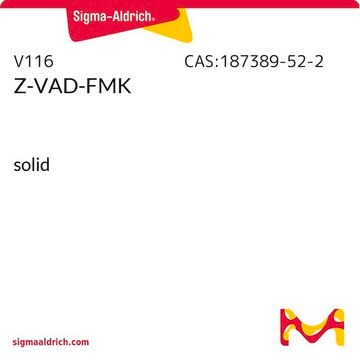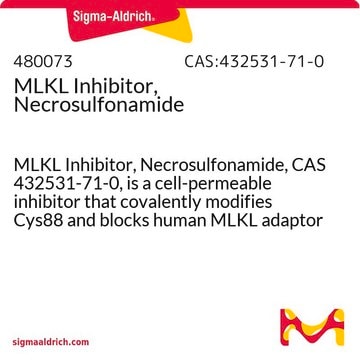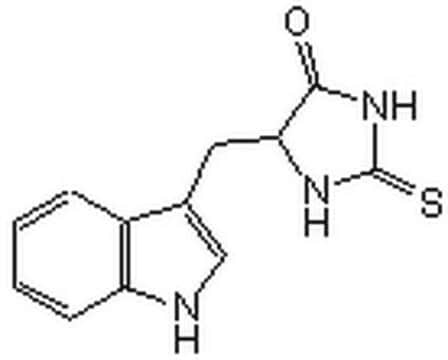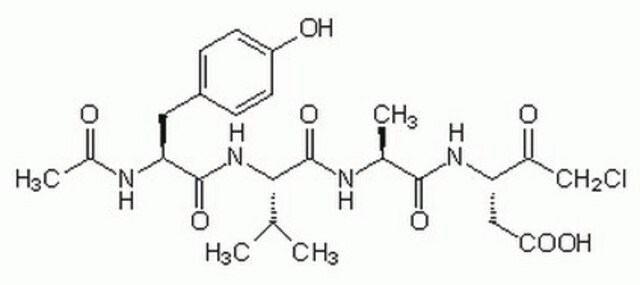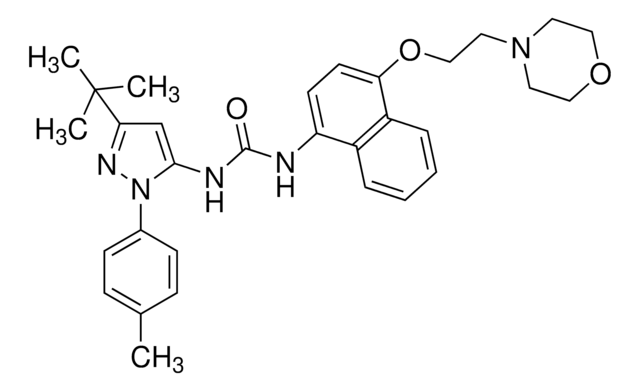480065
Necrostatin-1
≥95% (HPLC), crystalline solid, necroptosis inhibitor, Calbiochem
Synonym(s):
Necrostatin-1, Nec-1, Necrosome Inhibitor I, 5-(Indol-3-ylmethyl)-(2-thio-3-methyl)hydantoin, Necrosis Inhibitor II, Methyl-thiohydantoin-tryptophan, MTH-Trp, Receptor-Interacting Protein 1 Inhibitor I, RIPK 1 Inhibitor I, Nec1, RIP1 Inhibitor I
About This Item
Recommended Products
product name
Necrostatin-1, Necrostatin-1, CAS 4311-88-0, is a cell-permeable, potent, and selective blocker of necroptosis (EC₅₀ = 494 nM in FADD-deficient Jurkat cells treated with TNF-α).
Quality Level
Assay
≥95% (HPLC)
form
crystalline solid
manufacturer/tradename
Calbiochem®
storage condition
OK to freeze
protect from light
color
yellow
solubility
DMSO: 10 mg/mL
methanol: 5 mg/mL
shipped in
ambient
storage temp.
2-8°C
InChI
1S/C13H13N3OS/c1-16-12(17)11(15-13(16)18)6-8-7-14-10-5-3-2-4-9(8)10/h2-5,7,11,14H,6H2,1H3,(H,15,18)
InChI key
TXUWMXQFNYDOEZ-UHFFFAOYSA-N
General description
Biochem/physiol Actions
Blocker of necroptosis
Packaging
Warning
Reconstitution
Other Notes
Degterev, A., et al. 2012. Cell Death Differ.20, 366.
Christofferson, D.E., et al. 2012. Cell Death Dis.3, e320.
Takahashi, N., et al. 2012. Cell Death Dis.3, e437.
Degterev, A., et al. 2008. Nat. Chem. Biol.4, 313.
Degterev, A., et al. 2005. Nat. Chem. Biol.1, 112.
Muller, A.J., et al. 2005. Nat. Med.11, 312.
Teng, X., et al. 2005. Bioorg. Med. Chem. Lett.15, 5039.
Legal Information
Storage Class Code
11 - Combustible Solids
WGK
WGK 3
Flash Point(F)
Not applicable
Flash Point(C)
Not applicable
Certificates of Analysis (COA)
Search for Certificates of Analysis (COA) by entering the products Lot/Batch Number. Lot and Batch Numbers can be found on a product’s label following the words ‘Lot’ or ‘Batch’.
Already Own This Product?
Find documentation for the products that you have recently purchased in the Document Library.
Customers Also Viewed
Our team of scientists has experience in all areas of research including Life Science, Material Science, Chemical Synthesis, Chromatography, Analytical and many others.
Contact Technical Service

